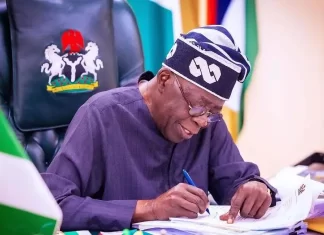As Ariwoola takes the judiciary to the top of the grease pole: It is a fitting coda to the tenure of outgoing Chief Justice of Nigeria, Olukayode Ariwoola, that the judiciary that he will leave behind has toppled both the Police and Customs services to reach the top of the institutional corruption grease pole in Nigeria. That is not a mean feat.”
At the end of July 2017, the United Nations Office of Drugs and Crime (UNODC) and Nigeria’s National Bureau of Statistics (NBS) issued a joint report on the public experience of and response to bribery in Nigeria. Among its findings, the report ranked several institutions with reference to public perceptions or experience of demand for bribes from officials at the point of service delivery. With a score of 46.4%, the report ranked the Nigeria Police Force highest in public perceptions of bribery. The report also noted that “at 33 per cent the prevalence of bribery in relation to prosecutors is the second highest, closely followed by judges and magistrates, at 31.5 per cent.”
It took a little while before the National Judicial Council (NJC) could dignify the report with acknowledgement. When it did, it was not to show institutional contrition for the serious findings contained therein or indicate what it would do to address it. Rather, in a release issued 18 days after the report, the NJC took issue with its content and rankings, complaining that it found the conclusions of the report “not only subjective but speculative”. Tellingly, the Council acknowledged that “there are a few bad eggs in the judiciary, like in every other arm of Government”, but rhetorically asked how many of the 1,059 judges and about 4,000 magistrates had been “caught receiving bribe”. With a touch of institutional insouciance, the NJC thundered: “How many Judges or Magistrates have been arrested and/or prosecuted and convicted of corruption till date?”
To the extent that it telegraphed the dispositions of the NJC on the question of judicial integrity, the contents of this release were staggering in many respects. First, for an institution lacking in direct electoral legitimacy, the NJC did not appear to be particularly bothered about the foundations of the pedestal on which the judicial institution whose authority it is supposed to guarantee, oversights the elected branches or brings to the resolution of disputes. Instead, it appeared to be entirely comfortable to compete with the average politician or bureaucrat in the grubbiness league tables.
Second, the Council put forward an implausible threshold for judicial accountability, confining it only to when a judge is actively caught in the act of bribery. If this were to be the standard of accountability applicable to judges, it would place them well below the average criminal, in terms of credibility. For the record, the applicable standard at common law is not whether or not a judge has been caught in the act of receiving a bribe but that, nothing is “done which creates even a suspicion that there has been an improper interference with the course of justice.”
Third, in querying how many judges and magistrates had been successfully prosecuted for such issues, the Council clearly diminished the role of judges in bringing about success or failure of accountability for the failure of judicial integrity, placing the burden for that outside the realm of judicial responsibility.
The month preceding the UNODC-NBS report that drew its ire, at the beginning of June 2017, the NJC had announced the “recall” of six of the eight judges, whom it had previously suspended from judicial duties. One of them was Hyeladzira Nganjiwa, a judge of the Federal High Court since May 2012. Almost contemporaneously, the Economic and Financial Crimes Commission (EFCC) launched a criminal prosecution against Nganjiwa including charges of unlawful enrichment and attempting to pervert the cause of justice. The Commission followed this up with a separate petition in December 2017 containing multiple allegations of unlawful enrichment against Nganjiwa. At its 85th meeting in March 2018, the NJC constituted a three-person committee to investigate the allegations against Nganjiwa, headed by Emmanuel Ayoola, a retired Justice of the Supreme Court. It included the Chief Judge of Oyo State and the Grand Khadi of Kwara State.
In its report in 2019, the NJC committee made many damaging findings against Hyeladzira Nganjiwa. For instance, despite being a judge of the Federal High Court, he was also receiving payments “in respect of Criminal Cases conducted at the Federal High Court by EFCC and NDLEA.” It also found that having “worked as a counsel in the Chambers of Rickey Tarfa & Co and since appointed as a Judge (sic), (Nganjiwa) continued to receive various payments made into his account even after being confirmed a Judge.”
Nearly two years earlier, Nganjiwa and his lawyers successfully forced out the presiding judge in his trial, Adedayo Akintoye, accusing her of bias after she ruled against his objection to her jurisdiction on the ground that as a judge, he could not stand criminal trial except after the NJC had found him guilty of misconduct, which, he argued, was not the case here. In what legal scholar, Osita Nnamani Ogbu, subsequently described as “judicial contrivance of immunity for judges”, the Court of Appeal later reversed the High Court, upholding the Nganjiwa’s objection. The court held that “if a judicial officer commits theft, fraud, murder or manslaughter, arson and the likes, which are crimes committed outside the scope of the performance of his official functions, he may be arrested, interrogated and prosecuted accordingly by the State directly without recourse to the NJC.” It discharged Nganjiwa but did not acquit him. The Supreme Court threw its weight behind the Court of Appeal.
READ ALSO: As Nigeria creepily becomes an impossible country
Rule by judges is not rule of law
This sequence of complicit jurisprudence effectively killed any fantasies of judicial accountability in Nigeria, all but clothing judges with impunity for acts and crimes that no one would brook if committed by lesser mortals. Despite the clear findings of its own committee of investigation, the NJC allowed Nganjiwa and many of his ilk to return to judicial functions. The consequences of this sequence have not been slow to advertise themselves.
Seven years after their first report of 2017 that roiled the NJC, at the beginning of July 2024, the UNODC and NBS issued the report of their third survey on corruption as experienced by the population of Nigeria. This 170-page report contains 15 references to judges none of which is particularly flattering. Among its many findings, the report deadpans that “among all types of public official for which there was sufficient data, with an average of NGN 31,000, the largest cash bribes were paid to judges and magistrates, followed by customs or immigration service officers (NGN 17,800) and members of the armed forces (NGN 16,600).”
It is a fitting coda to the tenure of outgoing Chief Justice of Nigeria, Olukayode Ariwoola, that the judiciary that he will leave behind has toppled both the Police and Customs services to reach the top of the institutional corruption grease pole in Nigeria. That is not a mean feat. The report finds a close relationship between corruption and nepotism, an enterprise in which Chief Justice Ariwoola excels, noting that “around 60 per cent of public sector applicants in Nigeria were hired as a result of nepotism, bribery or both – about 1.2 times the share found in the 2019 survey.”
When he retired as a Justice of the Supreme Court 20 years ago, Samson Odemwingie Uwaifo feared that the appellate courts “may soon be infested if not already contaminated with” the vice of judicial corruption. Today, his fears appear to have come true to an extent that even he would find frightening. That has been made possible with the baleful benediction National Judicial Council under its current leadership. In 2017, it took the Council 18 days to finish reading the first UNODC-NBS Corruption Experience Report. We will hopefully find out soon enough how long it will take the Council to digest the 170-page-long successor to that report in 2024.
- A lawyer and a teacher, Odinkalu can be reached at chidi.odinkalu@tufts.edu













